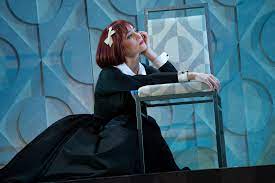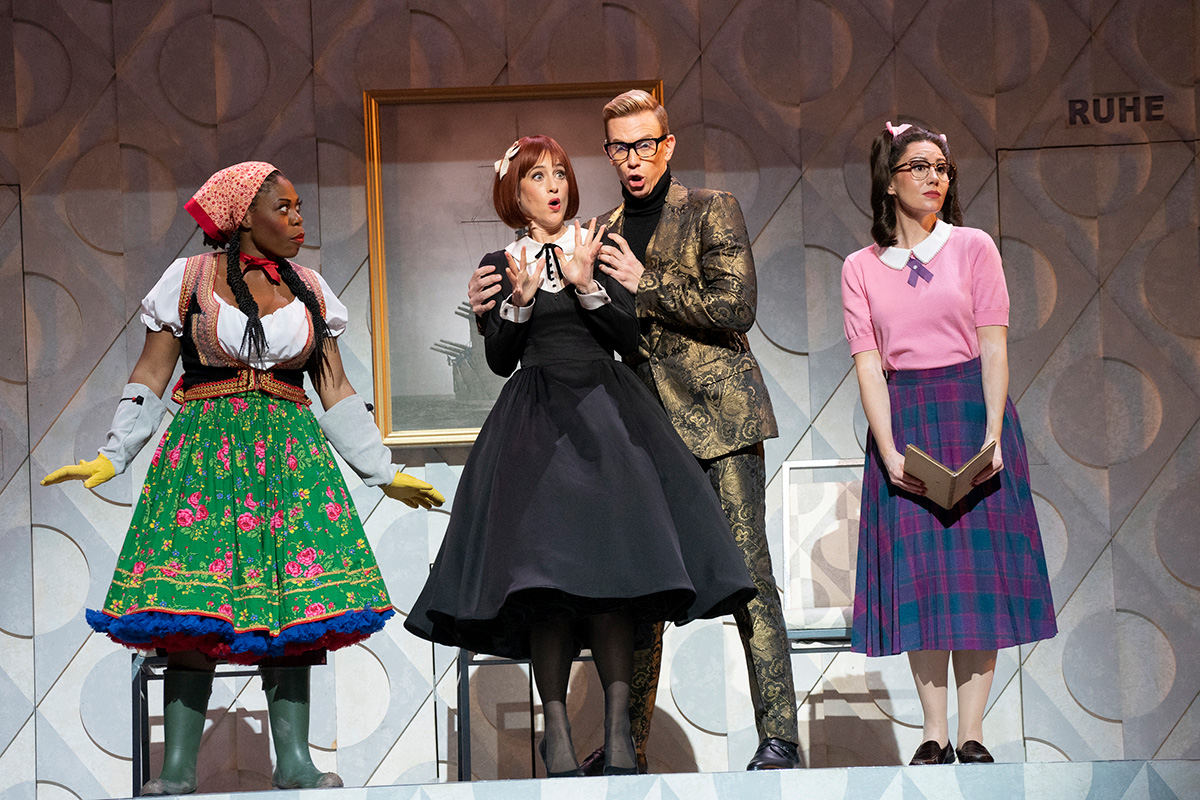Reviews
Strauss at SummerScape: A Ruse of a Ruse
 ANNANDALE-ON-HUDSON, NY—Operatic might-have-beens are a centerpiece of the Bard SummerScape’s annual season, the 2022 entry being Die Schweigsame Frau (The Silent Woman) in a brave production that makes an almost-best-possible case for this expansive collaboration between Richard Strauss and Austrian novelist and playwright, Stefan Zweig. The opera's composition was well under way when Hitler's rise to power defeated most major German composers. By the time of the 1935 premiere in Dresden, Zweig was exiled to London and even Strauss was on thin ice with Nazi officials. Die Schweigsame Frau was silenced after a handful of performances, and has since re-emerged only periodically, sometimes cut by as much as a third.
ANNANDALE-ON-HUDSON, NY—Operatic might-have-beens are a centerpiece of the Bard SummerScape’s annual season, the 2022 entry being Die Schweigsame Frau (The Silent Woman) in a brave production that makes an almost-best-possible case for this expansive collaboration between Richard Strauss and Austrian novelist and playwright, Stefan Zweig. The opera's composition was well under way when Hitler's rise to power defeated most major German composers. By the time of the 1935 premiere in Dresden, Zweig was exiled to London and even Strauss was on thin ice with Nazi officials. Die Schweigsame Frau was silenced after a handful of performances, and has since re-emerged only periodically, sometimes cut by as much as a third.
The Bard production is virtually uncut. Strauss and his brillibrettist were obviously having such a grand time writing this farcical comedy based on the Ben Jonson play Epicoene that they didn’t want to stop. Zweig was infatuated with Jonson right down to the minor characters and Strauss couldn't get enough of Zweig. Though both were to deliver some of their best work in the years ahead, the third act has such a valedictory quality, you wonder if they thought this would be their last. Thus, the opera is endless; so many times when a dramatic moment has made its case, the music just keeps going.
As a Strauss nerd, I was eager to hear the three-hour-plus score, both in the July 22 live stream and July 24 live performance at Bard's Fisher Center (where it plays through July 31). With any opera of this era, cuts can disrupt the piece's long-term tonal planning that can act on the listener like a carrot on a stick, constantly urging the ear forward. Though the opera's expansiveness was apparent by an Act I finale that is three times as long as the dramatic situation warrants, intermission chatter bordered on ecstatic. Hours later, the response was more muted. There’s “heavenly length” and there's “hopeless length”; this opera is somewhere in between.

Chrystal E. Williams (Carlotta), Jana McIntyre (Aminta), Edward Nelson (the Barber), and Anya Matanovic (Isotta) in Bard Summerscape's performance of Richard Strauss's Die Schweigsame Frau
"What you are about to hear and see may offend you. The opera is comic and irreverent," writes conductor Leon Botstein (also Bard president and Summerscape co-artistic director) in the program book. "The opera is one of Richard Strauss's most adventuresome. It is one of his boldest contributions to modernism, filled with rapidly contrasting sonorities, fast moving and elusive harmonic motion and wily allusions, quotations and reworkings from the operatic past." To that I would add that Strauss was a master of making much ado about little (the opera Intermezzo and the ballet Schlagobers [Whipped Cream] come to mind).
But while the composer's innate lyricism is always apparent, melody seems scarce. The overture (uncharacteristic of Strauss) begins with an appealing horn melody that is soon overtaken by much bustling orchestral activity. Other melodies surface periodically only to be prematurely cut off, concluding in a grand flourish of Strauss-ian ingenuity. That’s emblematic of the opera as a whole: Where you expect charm, you get ingenuity.
The plot
The plot surrounds aging sea captain Morosus, whose his ears have been destroyed by nautical explosions; he gets talked into a late-in-life marriage, a fake one, that's part of an elaborate scheme to access his considerable financial resources.
Another buffa comedy that makes old people look silly? Not really. In this one, Sir Morosus is three dimensional: lonely, on guard against any illusions of his romantic worth, and profoundly wise in his forgiveness of a huge panorama of characters—an aggressively enterprising barber, his nephew and wife, plus a troupe of actors—who try to take advantage of him. Aminta, his sham-wedding wife, is plagued by her own sense of humanity. Though ostensibly light comedy, a score of this length and breadth has implications beyond what lies on the surface.
Director and set designer Christian Räth infuses the production with a welcome undercurrent of danger, lent in part by the dominating character of the barber, played by Edward Nelson. As a first-class baritone with excellent German projection, he focuses the action around him with a physical vocabulary that extends the characterization beyond what Strauss and Zweig created. Nelson moves with the flexibility of a trained dancer, and early on morphs from oily charm to demonic intensity. Perhaps Act III--like Der Rosenkavalier's, a comic postscript to an opera plot that has been mostly resolved—seems tiresome because Nelson's character is less in evidence.
False worlds and comic bubbles
The production, apparently set in the mid-20th century, is alternately thoughtful and flashy. In a witty allusion to Rosenkavalier, Morosus offers a silver rose to his prospective wife Aminta, whose redecorating of Morosus's headquarters is intentionally and wildly vulgar. Just as Aminta and company create a false world around Morosus, so did Strauss and Zweig conjuring a bubble of comedy in Nazi Germany. In a life-as-theater moment, cast members carriy hand-held masks of Strauss, Zweig, J.S. Bach, Adolf Hitler, and others to remind us of the world around the opera.
It's a testament to Botstein's leadership in the pit that the American Symphony Orchestra never flagged over the long performance, and that the cast was able to move so freely around the stage in a complex score without falling out of sync. Besides Nelson, the cast's vocal hero was Harold Wilson as Morosus, holding up so well during this long opera to deliver his most poetic singing at the very end. At times, he was a bit too Wagnerian for an opera that wants so much to be light-hearted. His vocal quality was always best when not fortissimo.
Jana McIntyre deftly differentiated her inner self from her in-on-the-joke self with alternating vocal tone and color, though sometimes the challengingly high tessitura would have been better floated than shouted. Tenor Henry Portillo as Morosus's nephew Henry was a good character tenor with the necessary stamina to handle vocal lines that sometimes seem downright abusive (Strauss was on record as not liking tenors). One minor miracle was Ariana Lucas as the chatty housekeeper. The character is supposed to be merely comic; in fact, she is also the opera's conscience. After all, the housekeeper always knows everything.
Top photo: Jana McIntrye as Aminta
Classical music coverage on Musical America is supported in part by a grant from the Rubin Institute for Music Criticism, the San Francisco Conservatory of Music, and the Ann and Gordon Getty Foundation. Musical America makes all editorial decisions.





 FEATURED JOBS
FEATURED JOBS

 RENT A PHOTO
RENT A PHOTO


